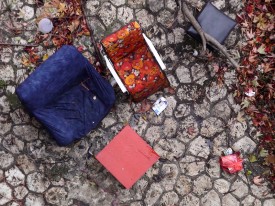I didn’t like Poles. Granted this was before I actually met a Pole who spoke Polish and had been to Poland. At that time, in my younger and more impressionable years, my experiences were confined to hyphenated Poles; Polish-Americans, Polish-Italian-Americans, and even Russian-Polish-Americans. Years later, upon meeting Poles, Poles who had grown up in Poland, speaking Polish, my position has changed pretty much to the opposite pole.
I am an American who grew up in Europe but had never traveled to Poland or met a Pole until recently. When I was about sixteen I returned to the United States with my family and was overcome by Poles. Everyone I met seemed to be Polish to some degree somehow, easily recognizable by the “ski” at the end of their name regardless of whether they were male or female. Polish-Americans had some sort of strange Polish cultural or national pride without really being able to explain what that meant. Many proudly announced that they were “Polacks” – once a racial slur in one of America’s ongoing anti-immigrant movements. To be fair, the hyphenated Poles I am referring to are not first or even second generation Poles, but three or more times removed for their immediate Polish ancestors.
Hyphenated Poles would speak to me of their Polish “heritage” of kielbasa, pierogis, punshki, and, to be honest, not much else. They knew Poland’s capital was Warsaw and that the Pope was Polish, which through their Polish side made them both more Catholic and Polish. This was, at the time, the foundation for my dislike of Poles. It was not surprising to me that Americans would reduce a national identity to a restaurant menu and trivial facts. It also didn’t help that I never had good pierogis or ate a kielbasa because I was a vegetarian. Punshki, what Americans call pączki, and an over emphasis on “fat Tuesday” seem to be nothing more than a thinly veiled excuse for Americans to eat fatty doughnuts for an observance few of them observed anyways. After picking apart, what Polish-American’s referred to as “Polish culture”, the dissatisfaction and disappointment moved in and my hesitation to believe Poland possessed anything of interest had formed. I had mistaken the hyphenated version for the purer, unadulterated one. Bi-polarity, photo: A. SłodownikAll Americans are hyphens in some way. I am an Irish-Italian-German-American myself. However, the operative term in such identity is without a doubt “American” except perhaps in the few cases of first or second generation Americans. The question therefore is why people believe that an identity that is four generations removed has a bearing on their current self? I carry no delusions that despite having lived more of my life outside of America, I am, to others or by self-identification, American. I am not alone in this picture. All identities are hyphenated; some are just more implicit than others. Without a doubt, few Poles need to emphasize they are Catholic-Poles, but there do exist people who might say they are Buddhist-Poles or atheist-Poles. Therefore, hyphenating a mainstream identity is not a way to expound or further explain whatever it is attached to. Poles are Catholic and to imply so is redundant. If the answer then is to not imply a deeper connection with the identity, hyphenated identities must be a way for us to signify our difference. Buddhist-Poles are Poles but would share little in common with a Buddhist farmer in the Himalayas. It is unlikely that they will ever meet or be able to share pączki. Hence, Buddhist-Poles must be saying they are more than Poles; that they are different – how very un-Buddhist like.
Bi-polarity, photo: A. SłodownikAll Americans are hyphens in some way. I am an Irish-Italian-German-American myself. However, the operative term in such identity is without a doubt “American” except perhaps in the few cases of first or second generation Americans. The question therefore is why people believe that an identity that is four generations removed has a bearing on their current self? I carry no delusions that despite having lived more of my life outside of America, I am, to others or by self-identification, American. I am not alone in this picture. All identities are hyphenated; some are just more implicit than others. Without a doubt, few Poles need to emphasize they are Catholic-Poles, but there do exist people who might say they are Buddhist-Poles or atheist-Poles. Therefore, hyphenating a mainstream identity is not a way to expound or further explain whatever it is attached to. Poles are Catholic and to imply so is redundant. If the answer then is to not imply a deeper connection with the identity, hyphenated identities must be a way for us to signify our difference. Buddhist-Poles are Poles but would share little in common with a Buddhist farmer in the Himalayas. It is unlikely that they will ever meet or be able to share pączki. Hence, Buddhist-Poles must be saying they are more than Poles; that they are different – how very un-Buddhist like.
Hyphenated identities
Hyphenated identities have existed since the primordial. Cosmopolitan identities have always existed. However, the extent to which they are currently politicized and made public is a more recently global phenomenon. People are more mobile and more connected than ever, and hence the potential for the interaction and fusion of multiple identities is an increasingly prominent feature of our lives.
But what does this difference amount to? Often hyphenated identities are only significant when people are part of a mainstream or widespread identity. To continue on this line of reasoning, we can infer that Polish-Americans are in essence employing difference in order to break with or qualify what it means to be “American”. Polish-Americans hopefully aren’t foolish enough to tell foreigners they are “Polish” – even though they no doubt take this opportunity with every Pole they meet. Hence, “Polish-American” is an internal designation used within the American identity. One possibility for this is that hyphenation allows people to construct a shared periphery that makes it possible for them to navigate away from the mainstream and into a smaller, more local identity. Scholars like Benedict Anderson have lead the field of identity politics and described national identities as both “inherently limited and sovereign”, perhaps implying that an identity’s viability is in part based on its limited and restrictive nature. The limits of identities can be very large and no doubt incorporate millions, if not billions, of diverse groups and people; see China, India, etc. Therefore, hyphenated identities may also play the role of providing an avenue through which people can connect to larger, more ambiguous or inclusive identities.  Identity talk, photo: A. SłodownikBenjamin Barber in For Love of Country argues that people naturally connect to their local or immediate and connecting to any greater overarching identity is impossible and undermines their “self” or personal identity. On the other hand, cosmopolitan scholars such as Martha Nussbaum and Kwame Appiah disagree and believe that because national and local identities are arbitrarily constructed our attachment to our local selves should be cultivated within an atmosphere of mutual respect for difference and diversity. Anderson points out that nations are “imagined” in the sense that while they are real communities that exist, they only exist because the state perpetuates the belief in its existence. There is no connection between any two Americans or Poles beyond a common belief in a shared identity and national pride. Common cultural characteristics can only extend so far, and my Polish friends have often commented on the differences between Poles from different parts of Poland. The same is true for America and all other nations. Hence, all national identities are in some sense vacuous and left open for interpretation – some more so than others. Barber argues that local identities are naturally more important because they are engaged on a daily basis. Therefore, nations will often have political and social factors to help connect various “locals” to a greater political identity: public schools, institutions, ceremonies, etc. Hyphenated identities may be included here because they help people place themselves into multiple categories simultaneously – they straddle both the national local by interconnecting the two. No doubt Polish-Americans feel a greater connection to America because their imagined Polish heritage provides social and cultural substance to a vaguely defined democratic political identity.
Identity talk, photo: A. SłodownikBenjamin Barber in For Love of Country argues that people naturally connect to their local or immediate and connecting to any greater overarching identity is impossible and undermines their “self” or personal identity. On the other hand, cosmopolitan scholars such as Martha Nussbaum and Kwame Appiah disagree and believe that because national and local identities are arbitrarily constructed our attachment to our local selves should be cultivated within an atmosphere of mutual respect for difference and diversity. Anderson points out that nations are “imagined” in the sense that while they are real communities that exist, they only exist because the state perpetuates the belief in its existence. There is no connection between any two Americans or Poles beyond a common belief in a shared identity and national pride. Common cultural characteristics can only extend so far, and my Polish friends have often commented on the differences between Poles from different parts of Poland. The same is true for America and all other nations. Hence, all national identities are in some sense vacuous and left open for interpretation – some more so than others. Barber argues that local identities are naturally more important because they are engaged on a daily basis. Therefore, nations will often have political and social factors to help connect various “locals” to a greater political identity: public schools, institutions, ceremonies, etc. Hyphenated identities may be included here because they help people place themselves into multiple categories simultaneously – they straddle both the national local by interconnecting the two. No doubt Polish-Americans feel a greater connection to America because their imagined Polish heritage provides social and cultural substance to a vaguely defined democratic political identity.
From the Interview with Martha Nussbaum
“I never said that we should not have a particular love of and attachment to our own nation. I compared our relation to our country to our relationship with our own children: just as good parents love their own children more, but still, compatibly with that, may and should seek a nation in which all children have decent life-opportunities, so too we may love our own nation more while seeking a world in which all citizens have decent life-opportunities.”
The limitations to dual-role identities are fairly obvious. When two identities are mutually compatible it may be the case that the individual is using the one to modify the other. Many would perceive a Buddhist-Pole as neither wholly Buddhist nor Polish – just something in between. However, the perceived mutual exclusivity of two identities will often create social conflicts. People who straddle two “incompatible” identities are often the target of social exclusion and repression. There are many contemporary and historical examples to draw upon: Polish-Muslims, Buddhist-Hindus, Muslim-Americans, Homosexual-Catholics, etc. I am not implying here that Muslims cannot be Europeans or Poles or that Buddhists can’t also be simultaneously Hindu, only that politicians and people often construct such identities to be mutually exclusive for their own self-interest. Muslims are constructed in the West as being anti-democratic, anti-capitalist, and even “anti-freedom” in America. As such a “barbaric” people, how could they possible fit into our little utopia? One of my favorite parts about my current home in Nepal is that such constructions do not exist or have only recently come to exist. South Asians will often identify as Buddhist-Hindus, Jain-Hindus, Muslim-Hindus, etc. Where the West has constructed division and mutual exclusion, many people outside of the West use mutual similarities to include and unify rather than exclude. When confronted by a foreign Christian missionary one of my Buddhist friends responded with “I love god too” and proceeded to tell them how devout he and his family was without realizing that devotion to another god is perceived as idolatry by Western-Christians. To him the shared belief in a deity or spiritual practice was a unifying rather than divisive factor.
Many scholars have written about the cosmopolitan qualities of non-Westerners, and have suggested that mutual respect based on a shared set of similarities should be deployed to bring people closer together and heal global-communal rifts. Martha Nussbaum and Kwame Appiah have argued that by fostering cosmopolitanism, humanity’s differences will become grounds for mutual respect and unity rather than intolerance, bigotry, and conflict. They argue that multicultural education and an early emphasis on the importance of diversity help people overcome their connection to their immediate locality, whether national or regional, and develop mutual respect for each others’ differences. The problems involved in creating and instilling such universal human values in people across the world are numerous. As other scholars have pointed out, people will always primarily connect to their local and immediate – they will always be Poles or Americans first and cosmopolitan citizens of the world second. However, if people did in fact feel like Polish-cosmopolitans, the rigidness and exclusivity of the former may be tempered with the flexibility respect for difference of the latter. Which bubble do you belong to?
Which bubble do you belong to?
photo: A. SłodownikMy first real encounter with Poles was also my first encounter with Polish-cosmopolitans; Poles who had lived and worked abroad, who traveled, and who spoke better English than me. It wasn’t until I met real Poles that I was able to distinguish between Polish-Americans and Poles; between an American’s love for fried desserts and pączki. Since then, I have had the fortune to come across several Poles, many of whom have now become my close friends. Throughout such encounters I have been able to kept meticulous field notes that I will now formulate into a record of a people and a country that are often overlooked.
Poland as a country and a nation deserves more attention that it receives – especially in comparison to Western European states. While being one of the largest countries in Europe and providing a large amount of Europe’s wage-laborers, it is fairly small in the global scale, economically less significant than Western European countries, and has only recently reemerged as an independent country. However, its emergence has little in common with “new” nation-states. Poland is staunchly nationalistic, has a very old history, and a large amount of national unity surrounding a set of common cultural and historical factors. While the younger Poles I have met have been less than enthusiastic about their nation’s conservatism and politics, they have been wholly committed to and proud of their rich cultural history and traditions. What I find so interesting about this is that these liberal Poles have no problem walking an identity tightrope – simultaneously embracing Poland as a nation and culture while rejecting a tremendous amount of that which is currently perceived as Polish. To be so opposed to such a large part of one’s own cultural and national identity, yet at the same time still feel intense national and cultural pride is a paradox I have yet to resolve, and is something I have noticed in many younger, liberal Poles. Liberal Americans on the other hand usually disdain their own culture and nation to such a point that they cease to identify in many ways with greater America.
Kwame Appiah in Cosmopolitanism:
Ethics in a World of Strangers
“We do not need, have never needed, settled community, a homogeneous system of values, in order to have a home. Cultural purity is an oxymoron. The odds are that, culturally speaking, you already live a cosmopolitan life, enriched by literature, art, and film that come from many places, and that contains influences from many more. And the marks of cosmopolitanism in that Asante village—soccer, Muhammad Ali, hip-hop—entered their lives, as they entered yours, not as work, but as pleasure.”
All identities, especially national, are in flux, but Poland may be perhaps more so because it is only since the fall of the Soviet Union that Poland has been able to define itself in the mainstream. Many younger Poles seem ready to push their country past the conservatism and traditions that became “Polish” when Poland regained sovereignty. Catholicism, especially the conservative cultural and social values associated with it, were an active force in the resistance against Poland’s occupation. The Pope, elected in part specifically to aggravate the Soviets, is perhaps the most prominent example of this. As a major voice and force of opposition to the Communist occupation, Catholicism and cultural conservative values naturally became what it meant to be Polish, culturally, socially, and politically, after the occupation ended. While such values and beliefs were unifying factors during the resistance, now that they have been in the mainstream for twenty years, many Poles, especially younger, more prosperous Poles, have begun to challenge such a homogenized religious identity that runs contrary to many of the other, more secular, European national identities. Perhaps this is where hyphenated identities come in. Atheist-Poles, Buddhist-Poles, diasporic-Poles and people who identify as such may be showing their resistance to their national identity by qualifying it. Not being a Pole myself, I can only speculate.
My discussion of Poles would not be complete without mention of the Polish language and humor. Language and humor are in many ways interrelated. Not only do they encapsulate much of the cultural schemas and values of nation or ethnicity, they are usually great markers of uniqueness from which much can be learned. Unlike their neighbors to the West, Poles actually do have a sense of humor; although what this sense of humor consists of is still a mystery. My friends and I have noticed that Poles are easy to laugh and like to make jokes – whether the jokes they make are considered jokes by non-Poles is a completely different matter. Many times I find myself sharing their laughs, but many times I also find myself laughing just so that I fit in with the other Poles. I have heard and read many popular Polish jokes and sayings that I have difficultly comprehending let alone laughing at; however, I generally find Poles naturally humorous in conversations when they are operating outside of a set of cultural jokes. Such jokes it seems, are intrinsically bound to the Polish language – which brings me to my next point.  Poland – darkness and kielbasa,
Poland – darkness and kielbasa,
photo: A. SłodownikPerhaps the most fascinating and wonderful things I have noticed about the Poles I have met is that they are in love with their language. Being an American, I not only feel like my country butchers the language on a daily basis, but now so many people speak some amount of English globally. Other nations are no doubt proud of their language — the French spring to my mind; yet, unlike the French, the Poles I have met have no desire to have everyone learn Polish. I have been taught a variety of strange Polish phrases and words, but have never felt that a Poles’ love of Polish implied that everyone should speak their language. In fact, my Polish friend once looked at me, started speaking Polish, and concluded by saying “Isn’t it the most beautiful language in the world?” I believe such a love was in fact enhanced by several unique qualities of Polish – its difficulty and its exclusivity.
The first thing I learned about Polish is that I would never speak it. Between the four hundred grammatical cases, endless gendering of every part of the sentence, extra letters and unpronounceable clusters of consonants, I gave up before I began. While I am not linguistically gifted, I have learned several languages and can speak and write Nepali quite well. This however seemed child’s play to my Polish friends, who spoke Russian, Polish, German, English and other “easy” languages. The difficulty of Polish is perhaps a reason for its limitedness, but rather than being worried about its continuance, the Polish seem pleased that relatively few people can speak it and delight in correcting even those who can. Many nations and people dream of international prominence and the widespread use of their language; however, Poles’ seeming willingness and delight in their linguistic and cultural exclusivity is an interesting characteristic of a people who are internationally becoming more and more prominent. It’s possible that Polish jokes fit neatly into this exclusivity as they seem to be only understood by other Poles. Such exclusivity may support the idea that while Poles often find lives by being outside their own country, they enjoy, at least in terms of their identity, being distinct from an overwhelming global collective.  Identities, photo: A. SłodownikThe above observations and insights are no doubt made based on a limited set of encounters with a limited set of Poles, who may or may not represent something greater than their individualistic characteristics. However off I may be in my remarks about Poles, I have finally learned to distinguish between the Pole, the hyphen, and the American. Only recently an American friend of mine emailed me and said he was dating a Pole, one who has never been to Poland, spoken Polish, or had good pierogis. Such a statement stokes my distaste for falsely identified Americans, masquerading an affinity for a deep and rich cultural heritage they know little about, but at least I have learned my lesson and can now tell the difference: real Poles share only their hyphens with Polish-Americans.
Identities, photo: A. SłodownikThe above observations and insights are no doubt made based on a limited set of encounters with a limited set of Poles, who may or may not represent something greater than their individualistic characteristics. However off I may be in my remarks about Poles, I have finally learned to distinguish between the Pole, the hyphen, and the American. Only recently an American friend of mine emailed me and said he was dating a Pole, one who has never been to Poland, spoken Polish, or had good pierogis. Such a statement stokes my distaste for falsely identified Americans, masquerading an affinity for a deep and rich cultural heritage they know little about, but at least I have learned my lesson and can now tell the difference: real Poles share only their hyphens with Polish-Americans.










